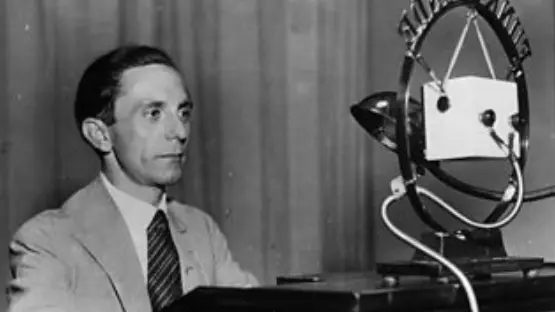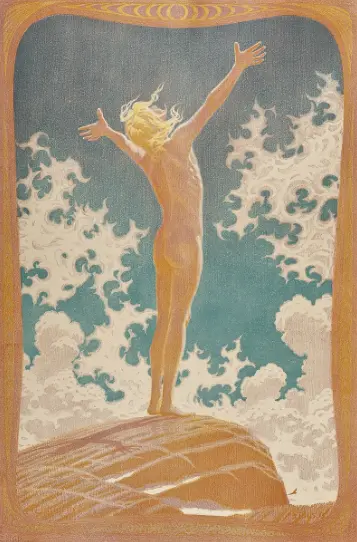Our Hitler: A Public Radio Address from Hitler’s 53rd Birthday
Our Hitler
Goebbels’ 1942 Speech on Hitler’s Birthday
At this time, a film called The Great King is playing in movie theaters across the Reich. This film chronicles the hard trials and historic challenges that Frederick the Great endured during the critical phase of the Seven Years War which took place before he led his army to final victory over his enemies. This film takes the unique figure of a great Prussian king off of his pedestal and removes any anecdotal incrustations in order to show us how things really were and what really happened. This film avoids the usual portrayals of this renown historic figure; instead, it gives us a personal and human picture of a unique statesman and military genius. As curious as it may sound, today he seems even greater in his defeats than his victories.
Shallow popular accounts of the great Prussian king sometimes make it seem as though he dealt with the difficulties and problems of warfare with ease. In this film, however, we see a struggling titan with a deep heart who endured an inferno of sorrow along with pain of every conceivable physical and spiritual nature, plus he endured the deepest human disappointments and the hardest of mental tests for seven long years. He was alone, he was deserted, he was almost toothless, and he was a wreck of a man who was plagued with gout, then came the day when Berlin jubilantly received its returning king. On this day of return, he sat with tears streaming inside of the Charlottenburg Palace chapel after experiencing an almost inconceivable release from the nameless miseries and anxieties he had faced as the thundering tones of Grauns’ “Te deum” resounded from the church’s organ.
It is clear that telling such a candid story which outlines the life and struggles of our greatest Prussian-German king is somewhat risky, even if this film is very historically accurate and very educational to people who are living in our times. Creating this film was risky because it is more pleasant to present historical persons and events in ways that are pleasing to the average person, and this is true because nothing is easier to believe than the idea that all of history’s great victories were the result of military and political superiority, and it is also nice to think that that the goddess of war always smiles upon her chosen stars. In such idealized revisions of history, even presenting an occasional danger, or even presenting an occasional threat against our heroes can be perceived as defamation to their reputations and defamations against their historical personages.
However, this film presents history from a different standpoint because it truthfully shows the human side of a true genius in a manner that emphasizes Frederick II’s superhuman attributes. The greatness of historic figures grows not from themselves, but rather from the weight of the fate they must bear. The physical suffering, the spiritual burdens, and the temptations of the heart that great historical figures have always faced allows their character to stand out more vividly, and these great trials also mark their outlines more clearly. This film shows why Frederick II earned the right, uniquely, to bear the name “The Great.” Despite the numbing blows of fate that often drove him to the edge of the abyss, he found the strength to rise triumphantly above his struggles and defeats. Frederick II set a shining example by showing steadfastness in the face of misfortune. Frederick showed steadfastness amidst misfortune in front of his soldiers, in the face of his doubting generals, in the midst of his wavering ministers, amongst his conspiring relatives, and also within the ranks of his protesting civil servants, and for showing this level of strength and courage during times of hardship he deserves to remembered as being great.
This film proves the sound political and historical instincts of our people and it makes no compromises when presenting the unadulterated historical truth. This film is not a usual historical romance, and despite what one might expect, the broad masses have taken it as a wakeup call and they have made it into a success with hardly a comparable precedent within the history of German film.
No one fails to be moved deeply by this film and it has clear parallels to the present because the words that a great king speaks and the spiritual crises that he and his people overcame through battle and passion resonate with our present times. The makers of this film felt obliged to remark that production was not planned for educational purposes a little while before this past Christmas; but rather, production of this film was planned in the early summer of 1940 when there were no ideas about today’s duties and challenges. The contemporary significance of this film’s words and the resemblance it bears to the events of today are not the result of conscious propaganda, but rather, these similarities are the product of deep historical laws.
This is the truth, each century has its own historical mission, and these historical missions do not repeat themselves, indeed, all historical missions are so deeply bound to their era that posterity can hardly offer more than a cursory historical understanding concerning the political problems of past epochs. What remains is the ways in which history is made, the style and manner of expression that a statesman or military genius uses, along with the resistance that raises him far above his era, and above all, the superhuman strength with which he meets his challenges is the thing that endures through time.
How can the fact that Frederick defeated the Austrians be relevant to our day? His value for the present generation is in the worth of his personality, which was expressed through the powerful strength of his historic genius, by his faith that moved mountains, from his steadfastness in misfortune, in the impressive way that he fulfilled his secular mission, and throughout the heroic isolation where bore the dark shadows of his fate. It was Frederick II who said that he who wants to transform the world cannot enjoy the world.
Like Frederick II, we are living in a time where the world is being transformed, therefore we cannot enjoy our world. As perhaps never before in history, the fate of our people is in the hands of a single generation. Our peoples’ desire for life and our peoples’ desire for self-assertion will usher in a new and unprecedented age, or perhaps we are standing at the end of our history. Such moments in the rise and fall of nations always exert a powerful magic on brave and manly people who view these dangers and burdens as a chance to prove their mettle which they know that they must do if they are to be weighed in the balance of fate and not found wanting. The path to victory leads ever through the depths of danger and historical testing, and our people must withstand many trials during this war. Our nation must be also be armed against the tricks of a fickle fate that likes to subject its favorites to hard and bitter testing until they finally wear the wreath of victory on their brows.
A generation blessed with a great personality in such dangerous times is to be envied. In the course of this war, our people have found all sorts of causes that might bring inspiration for victory; for example, some of our people are driven by visions of gaining greater economic and military resources, others within our ranks are motivated by the possibility of a seeing a higher population develop in the future, and others within our numbers have foreseen a better geographical position for our people realized at the end of this conflict. Some of our citizens have peered into the future and witnessed the famed bravery of our soldiers along with our tough civilian morale transforming into the stuff of legend. Regardless of the outcome, this war is a stage where systems are pitted against other systems and world views are contested against other world views in order to see whose chances of success are better. We believe, however, that victory will fall to the side with the better leadership, as it always has. Leadership is crucial. If a side with better leadership also has better material resources at its command, then no power in the world can prevent a victory.
We have come through a winter whose hardness and length have no equal in human history. This present winter poses challenges to our leaders, to the war front, and to the homeland that we only now realize. Later generations of historians will write numerous accounts of this most moving chapter of our great battle, and no person among us can doubt the almost legendary heroism that German soldiers have demonstrated. If our people have ever shown that we are able to assume the leading role on our continent, and if we have any historical right to do so, then it shall be proven at this time. The German people have proven their merit this past winter because a nation that survives such tests is destined for victory.
How often in these last hard weeks and months have the German people looked in spirit to the Führer? Never has the whole nation felt so bound to him as it has in these hard times which have spared no one. We felt as if we had to see him, ever if it was only in the form of a photograph, to gain the strength that each of us needs to overcome the difficult daily tasks that we all face. Each of us feels obligated to him! Each word that he has spoken to his nation is an order to follow for every man, every woman, every child, every solder, every worker, and every farmer! All are with him, even without hearing many words and without being told what to do! The whole nation lives with an unspoken assurance that while we are dealing with our lesser or greater troubles, he is fighting a gigantic battle in the East. At this time, our leader plans late into the night, he weighs, he considers, he takes risks, and he stands watch at his headquarters. From his headquarters his will flows to out to the most distant battlefields and invigorates even the last soldier serving in the most embattled unit.
The power of his personality is felt nowhere more powerfully than at the front. A soldier must feel led, or else he cannot endure the daily risks to life. A soldier needs strong leadership when he must risk his life for that of his nation, and a soldier’s need for leadership is strongest when he is far from his commander and he must follow the dictates of his conscience alone.
Times such as these are where the value of a great and powerful personality is proven, and this is what Goethe calls the highest blessing amongst mankind. A great confidence arises from knowing that there is a leader who stands above all, who knows all, who weighs all, and who understands the sorrows and pains of his people even without having daily contact with them, and who also feels every loss that touches mothers, women, and children; yet, he is still able to summon the strength that is needed to build a greater life for his people despite the present hardships! The confidence of our leader allows all of us to endure the sacrifices and burdens of each day more easily.
Nothing is harder than to accept the responsibility for the future of a great nation. Accepting such a huge responsibility requires not only courage, but it also requires a readiness to risk everything. This type of courage also demands bravery of the soul and steadfastness of the heart, but above all, the courage of our leader demands renunciation. From this renunciation grows a historical personality that is able to endure the lonely heights at which his sole duty is service to a cause.
This is how the German people saw the Führer during the past winter — surrounded by his aides, politicians, and generals, while also surrounded by the love of countless millions of his people; yet, in the end, he can only rely on himself alone, and he must carry the heavy burden of responsibility for his people on his own shoulders while he fights for the life and fate of his nation.
No matter how high we may climb, and whatever burdens we may carry, each of us has at least one who is still above him, on whom he may rely, and to whom he must obey, yet our leader takes the heaviest weight from each of us when the burden grows too great, and for this reason, he fills all of us with new strength when we lose our courage, when we doubt, and when we tire. He reminds us of the great lessons of our time, he also reminds us of our worldview, and he gives us new life.
Those who have the great fortune or working within his vicinity, along with those who are blessed with the honor of actually working with him personally receive the same strength and blessings that he gives to the unknown soldier, the unknown worker, and the unknown farmer, so the greatness of our leader supports and sustains us all. We all feel ourselves to be safe in the protection of a man who has changed our century, so we need only follow him, for his task is to show us the way. He stands alone and he wages a titanic battle against fate for the life of our people.
On the eve of his 53rd birthday, the whole nation gathers around the loudspeaker. This event is far more than simply a festive occasion because it confirms what all Germans sense and it confirms what all Germans feel with more depth and greater obligation than ever before. In some sense, listening to our leader’s birthday address is a renewal of our loyalty and a renewal of our faith that has already been proven a million-fold through deeds, through uncounted sacrifices, and through the risks of bodily injury and a multitude of bitter deaths which have already been taken; thus, our loyalty needs no words.
If ever the German people has felt united in thought and in will, then it is in this: to serve him and to obey his commands. The sounds of heroic and titanic music streaming from every German heart raises our confession to a solemn and holy height. When we finish our celebrations, the voices of men and the sounds of instruments will join in the great conclusion to the Ninth Symphony. As the powerful Ode to Joy sounds and a sense of the greatness and scope of these times reaches to even to the most remote German hut, and as the sound of this music reaches to distant countries where German forces stand watch, each of us, whether a man, a woman, a child, a soldier, a farmer, a worker, or a civil servant all understand the seriousness of this hour and the joy of being a witness and a participant in this great historical epoch.
We call the eternal power that rules over us the Almighty, or we might call this power God, we may also call it Fate, or perhaps we name it as the Good Father, but is also that which the Ninth Symphony says, lives beyond the stars. We ask the Almighty to preserve the Führer, to give him strength, to give him blessings, to favor his work, to increase our faith, to make our hearts steadfast, to make our souls strong, to give our people victory after battles and sacrifices, and to bring these times to fulfillment.
There is no greater good fortune on earth than to serve a brilliant leader and to do his work. May we do that each day. The difficulty of our day is also its greatness, so we would change places with on one.
In gratitude and loyalty, we send the Führer our greetings. An unbreakable band unites the front and the homeland. Germans throughout the world are united in the fervent wishes that we bring each year on the eve of his birthday:
May he remain to us what he was and is:
Our Hitler!





